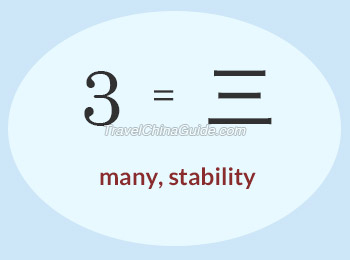Lucky Number 3
General Analysis
 People with the lucky number 3 have strong personalities. They possess mystical abilities and a powerful creativity. With an instinct for art, they prefer to create the sense of beauty in life. These people are sociable and talented at convincing others that their own view on life is to be easygoing and contented. Also, they have a magnetism that inspires a secure and peaceful atmosphere around them. They have a high self-esteem and will do everything to gain the attention of others. However, they are more likely to be conceited and refuse to face the reality when disappointed like a spoiled child. The life lesson for them is to learn to listen to others.
People with the lucky number 3 have strong personalities. They possess mystical abilities and a powerful creativity. With an instinct for art, they prefer to create the sense of beauty in life. These people are sociable and talented at convincing others that their own view on life is to be easygoing and contented. Also, they have a magnetism that inspires a secure and peaceful atmosphere around them. They have a high self-esteem and will do everything to gain the attention of others. However, they are more likely to be conceited and refuse to face the reality when disappointed like a spoiled child. The life lesson for them is to learn to listen to others.Romantic Relationship
When they find a compatible person, they wish to stay with their mates permanently. It is hard for them to accept anything that does not meet their demands. Then they would argue a lot (after all, they have great arguing skills) to make their partners change for them. However, as time passes by, the passion of their partners will lessen due to their moods. Therefore, it is advisable for them to change themselves a little.
Number 3 in Chinese Culture
Moreover, Three has its origin in Confucianism and Taoism. It stands for Heaven, Earth and Human being; philosophically, ‘Tao’ means the amiableness among the above three elements. In Chinese tradition, the phrase ‘San Huang Wu Di’ (Three Emperors and Five Sovereigns) generally refers to all emperors of ancient China. Besides, much wider uses of this number can be found in Chinese culture, concerning proverbs, history and common sense:
1. Three Character Classic (Chinese traditional enlightening book)
2. Three visits to the thatched cottage of the great sage, Zhuge Liang (a well-known story that Liu Bei asked for a talented assistant in the Three Kingdoms Period 220 - 280)
3. Three Kingdoms: Kingdom of Wu, Wei and Shu
4. Three Gorges of Yangtze River: Qutang Gorge, Wu Gorge and Xiling Gorge
5. Three Great Halls of Forbidden City in Beijing: Hall of Supreme Harmony (Taihedian), Hall of Central Harmony (Zhonghedian) and Hall of Preserved Harmony (Baohedian)
6. Three Sages in Chinese History: Confucius, Lao Tzu and Mo-tse
7. Three Emperors: There are many versions, among which the expression of Fu His, Nue Wa and Shennong is the most popular.
8. Three Ancient Moral Guidelines: Courtiers being obedient to their emperors, sons being obedient to fathers and wives being obedient to husbands.
- Last updated on Oct. 07, 2022 -